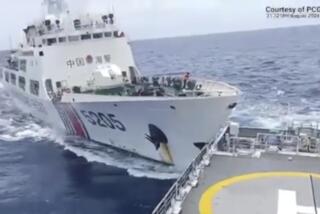Japan to free Chinese boat captain
- Share via
Reporting from Beijing — Japan will release the Chinese fishing captain whose detention after straying into disputed waters had enraged Beijing and spiraled into the worst diplomatic crisis to rile the long-contentious neighbors in years, prosecutors in southern Japan said Friday.
The abrupt announcement from Japan came as mounting pressure and threats from Beijing stirred fears of serious economic repercussions for the island nation.
“Considering the future of Japan-China relations and the possible consequences for the Japanese public, we decided that keeping the suspect in custody and continuing the investigation was not appropriate,” Toru Suzuki, an official from the prosecutors’ office in Naha, Okinawa, told NHK TV in Japan.
The 15-man fishing crew was seized this month after the boat collided with Japanese coast guard vessels near disputed islands known as Diaoyu in China and Senkaku in Japan. The rest of the crew was soon returned to China.
But Japan has kept the captain in custody since Sept 8, accusing him of illegal fishing and deliberately ramming his craft into the Japanese patrol boats. Earlier this week, to the fury of Chinese officials, a Japanese court extended his detention until Sept. 29.
Friday’s announcement handed an undeniable psychological victory to Beijing, and news of the impending release was greeted in China with a mix of satisfaction and lingering indignation. The Chinese foreign ministry said it would send a chartered plane to ferry the fisherman back to his homeland -- and sharply warned Japan against pressing charges.
“I want to reiterate that any form of prosecution brought upon the Chinese captain by the Japanese government is illegal and invalid,” foreign ministry spokeswoman Jiang Yu said in Beijing.
In Japan, officials denied that politicians had a hand in freeing the captain.
“The decision was the result of a somber process carried out under Japanese law,” said Chief Cabinet Secretary Yoshito Sengoku, the government’s top spokesman.
At the heart of the dispute lay clashing claims on the islands, which are controlled by Japan but claimed by both China and Taiwan.
In recent years, an increasingly nationalistic Chinese public has griped that the government has shown weakness by failing to stand up to Japan and press its claims to the islands. Like all irritations between the two longtime rivals, anger over the fisherman’s detention was deepened by lingering bitterness in China from Japan’s invasion and brutal oppression during World War II.
At the United Nations this week, Chinese Prime Minister Wen Jiabao called upon Japan to “immediately and unconditionally” release the captain, and warned of further repercussions if Tokyo ignored the threat.
This week, as anger swelled, China made plain its willingness to take harsh steps to free the fishing boat skipper.
On Friday, Japan’s trade minister accused China’s trade ministry of instructing exporters of rare earth metals to halt badly needed shipments to Japan. China flatly denied reports of imposing a limit on the exports.
Meanwhile, Chinese state security officials told state-run news agency Xinhua that four Japanese citizens were being investigated for illegally entering a military zone. It wasn’t clear from the official account whether the Japanese had been detained.
The men had traveled to China’s Hebei province this week to research a bid on a project to dispose of abandoned chemical weapons, explained their employer, Tokyo-based Fujita Corp. The company told reporters one of the men sent a one-word text message reading “help” just before they vanished, along with a Chinese employee.
China had already reacted to the fishing boat incident by dissuading its citizens from spending tourist dollars in Japan and cutting off bilateral government contacts at the Cabinet level.
“The release of the captain will help both governments contain the damage, but the damage has already been done,” said Jin Canrong, dean of international relations at China’s Renmin University. “The government can see the possible danger in coming years. Japan is in a political drift, and nobody is really taking charge. And we don’t know how to deal with Japan.”
Japan’s uncharacteristically hard-line stance in hanging onto the captain seemed, in part, an effort to demonstrate that it was willing to stand up to China.
Some observers have suggested that Foreign Minister Seiji Maehara, appointed just days ago in a Cabinet reshuffle, had pushed for resistance to China’s demands. A security expert, Maehara has said that China’s increased military presence in the region is a “threat” and that Tokyo should “defend Japan’s sovereignty,” referring to the disputed islands in the East China Sea.
This week Maehara appeared to soften slightly, suggesting that Tokyo was open to high-level talks with Beijing.
It was not yet clear when the captain, Zhan Qixiong, would be returned to China.
In a pathos-laden dispatch from his village, Xinhua reported that stress over Qixiong’s detention had killed his elderly grandmother, and that the family was too depressed to buy traditional pastries to celebrate the autumn festival. Instead, the dispatch said, the fisherman’s family would eat instant noodles.
--Special correspondent Kenji Hall contributed from Tokyo
More to Read
Sign up for Essential California
The most important California stories and recommendations in your inbox every morning.
You may occasionally receive promotional content from the Los Angeles Times.













